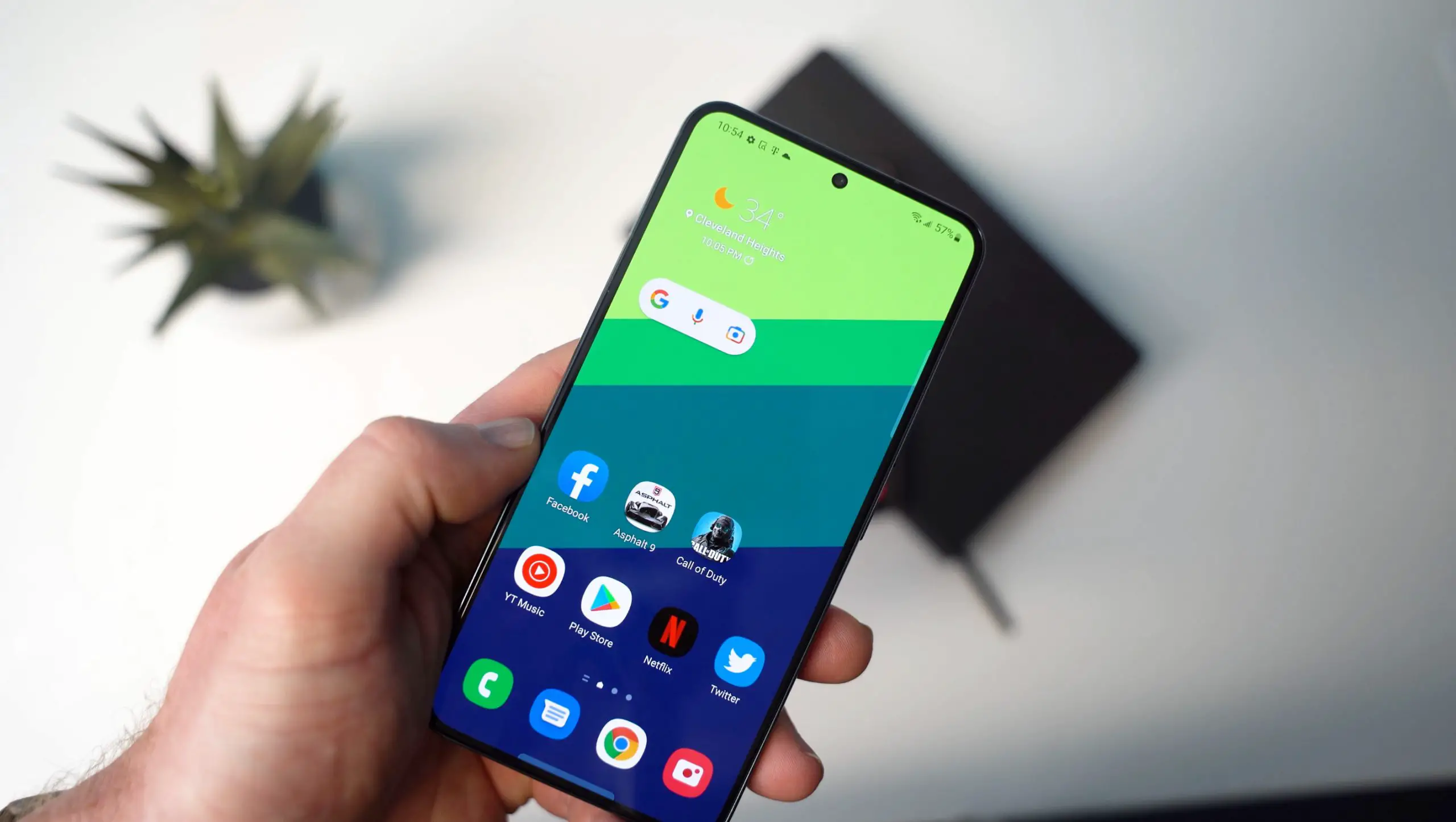 We’ve heard the discussion about HTML eventually taking over the universe but I think this may be the first time I’ve heard Eric Schmidt say it directly and so succinctly. I’d have to double-check word for word, but the quote I heard was:
We’ve heard the discussion about HTML eventually taking over the universe but I think this may be the first time I’ve heard Eric Schmidt say it directly and so succinctly. I’d have to double-check word for word, but the quote I heard was:
“HTML 5 is the way almost all applications will be built, including for phones.”
That kind of blows my mind. If HTML 5 takes over then is Android really that big of an advantage for Google? Won’t all the other platforms be able to leverage HTML 5 to create competitors more on par with Android? Google’s big business is advertising so… do they even care?
Let’s hear your thoughts in the comments and feel free to vote in the poll!
[polldaddy poll=4557768]











I would be surprised if HTML5 didn’t take over. They’ve been talking about it for a year…or at least hinting at it.
It’ll make every phone, regardless of an open or closed system, compatible with apps, as long as the browser enables it.
It’s interesting because HTML 5 has been postponed until 2014.
HTML5 will never surpass the overall quality that native can, it’s a pipe dream by those with a vested interest.
“Won’t all the other platforms be able to leverage HTML 5 to create competitors more on par with Android?”
I don’t get it. How is it easier to create a smartphone OS (like Android) if apps are built on HTML 5? Can you explain your thinking?
But yes, HTML5 is on the way. I am writing a Chrome App with HTML5 and CSS3 etc… You can really build nice things with the technology especially now that browsers are so damn fast. You can really pile on the JS and get lots of eye candy… on the desktop at least.
Chrome on Android Please!!
how can an html technology take over an operating system? i’m confused. i’m pretty illiterate when it comes to this stuff. can someone please explain in layman’s terms?
Google could care less. Google has Android to drive the adoption of the web as a whole, whether it be through Android directly or by driving competition. Google makes their money online, so getting people online is more of a priority than getting people to buy Android devices. Obviously, Google prefers that you use Android because its directly tied with Google services, but they just want people online where Google makes the big money. One of the reasons i like Android is I trust Google more because they’re not out to get my money through it but rather just improve my experience with the web. They create a better web experience for me and I get online and view their ads as I browse its a win-win. Apple on the other hand sells hardware and services, so getting you to buy a new iPhone every year is part of the plan. They’re out to get you more with the hardware and lock you into their services, which I don’t particularly like.
How in the heck are you going to program a OpenGL game, or an audio synth app, in HTML 5? I don’t see this as happening. In fact, many apps out there already try to just be a “web shell” and they get slammed for it. Mainly because it just increases data usage, secondly because it feel cheap and crappy.
-Brad
So is he saying that eventually they’re going to go a similar route to BB WebWorks?
I love you google but this one I don’t believe is in the cards. I’m all for cloud computing but carriers are going the wrong way with their services for mobile apps to be all cloud based.
Tier based data will not let cloud computing take over. If you think AT&T is bad guys, come up here to Canada and feel the data pain. $90.00 a month for a plan and only 1 or 2 gig to show for it.
I expect mobile devices to eventually replace computer, even for gaming, but you can’t exactly download a game off the clouds every time you want to play.
Quite frankly, ChromeOS could be made for a smartphone.
Android and ChromeOS will merge.
Oh, the websites will take over thing again?
I already have a choice of using the web version of GMail or the native Android version. The native version wins EVERY time.
Also, have no internet connection? You are screwed!
.
Websites are websites, native programs are native programs.
I refuse to call them HTML5 apps because they are websites that are made to the HTML5 standards.
.
.
@2.jmax: HTML5 is a standard for HTML and not a product. They can’t hold off people using it till 2014, it is already slowly being added to all the modern browsers. Although Google and Apple have been pushing the standard way too fast and endangering the stability of the standard.
I think many of you underestimate the capabilities that HTML5 and modern browsers offer, and how quickly things are changing.
About a year ago browser makers and web designers basically decided to shun “standards” in favor of a free-for-all innovate or die model. The result is browsers like Chrome and IE9 that offer deep integration with the desktop and “installable apps”.
I am currently building an HTML5 “web-app” that doesn’t use the web at all. No internet connection needed at all, ever, once it’s installed. Yes it will be able to save your data, even as a text file on your hard drive if you wish. I haven’t written a single line of server-side code, in fact there is no server, period.
Those of you saying “it will never do X” could very well end up eating your words. We’re already seeing simple photo-editors in HTML5, and there is plenty more innovation to come.
Android is built on Linux and Java. Linux and Java are available to competitors. Therefore competitors will catch up and destroy Android. Must be a slow news day.
So, HTML5 will become just like Flash eventually in the “Write once, read everywhere” sense?
History repeats itself… Get some poorly executed version and leave some people disappointed and someone is probably going to pipe up with another product they believe is a better solution. And the cycle continues.
Not that I’m against that, missteps lead to innovation and that leads to competition and that benefits us all. I just don’t feel some people should give Flash the bad rap that they do.
HTML5 will be good for many things but not all. Third party software/plug-ins will always be required for a speedy evolution to occur.
There are many very important things that HTML5 cannot do (once it’s finalized). So is the world supposed to patiently wait until 2035 for HTML6?
Brad 2: search youtube for WebGL which is part of html5. mind = blown
Len: one of the main features of html5 is saving all or part of the website locally, using only as much bandwidth as current apps.
teleclimber: right on! run through any list of top 100 apps, html5 can pretty much do it all.
The apps that you want to buy will not be made with HTML5.
Developing in Html and javascript compared to Java sucks big time!
I think that by the time HTML5 gets good enough to be used by anyone in their phone, Nokia-MS partnership will have failed anyway, so it won’t affect Google.
@jmax, HTML5 will be ratified in 2014. It was previously planned to be ratified in 2022. It’s been brought *forward*, not postponed, eight years and most features are ready to use now (although you do need a JS shim for IE). It will move to last call status later this year, which is good and bad. Good because the proposed standard can be implemented with a lot more confidence. Bad because the standard will be practically set in stone. Plugins like Unity and Flash will do a hell of a lot of innovating between now and 2014 and beyond. They already can do much, much more than HTML5 although I think it’s a good situation if 95% of the things on the web are implemented using standards and only 5% is the optional, cutting-edge plugin stuff.
@bob: I’m not one to close my mind and say it couldn’t be done, but I am curious how, say, “World of Warcraft” could be made including their anti-cheat functions and done in a way their “source” would be secure. Also, do you think HTML 5 would be fast enough to handle a full blown tier 1 game and not just proof of concept apps?
I long for the day Windows loses its foot hold on games.. which is really the only thing windows has other os’s don’t. But don’t give me false hope bob.. don’t do it.
I’m glad that honeycomb will come with renderscript for low level 3D acess and a new low latency api for audio.
Based on the majority of comments, and general knowledge of the subject, I think it’s safe to call Eric’s statement false at best, but more accurately misguided and ignant… No?
ummm, html5 is web apps, to be honest web apps are good for some things but regular old apps aren’t going away any time soon.
HTML5 could potentially do a whole lot if the device APIs and operating system permit broad and deep access to core functions, sensors, etc. HTML5 would simply be the glue that allows you to build apps that pretty much have the same functionality as native apps do today. The lack of rendering APIs for things like 3D doesn’t allow someone to create such apps in HTML5 today. Eventually this will be much less of an issue. You can almost see where Eric S is moving people to thinking of the world in the context of Chrome OS. Ultimately Android as a OS may offer a super robust set of constructs that would allow HTML5 to provide a amazing experience on. The same HTML5 app on another platform (let’s say for example Win7Mo or iOS) may not even compare if similar constructs are not exposed by the OS.
The only advantage android enjoys over the others is Flash 10. Of course a move toward HTML5 will hurt them.
If Nokia/Microsoft takes off phandroids will yet be another distant memory like netbooks.
As long as they keep the marquee tag. that is a must.
There seems to be some confusion about HTML-CSS-JavaScript.
HTML is language for semantically describing the visual content. That is, you can say that you have a table, images, paragraphs, that sort of thing. (Think nouns)
CSS enables you to define how those elements will look, where they’ll be positioned, and to a very limited extent, how they might behave (:hover). (Think adjectives)
JavaScript adds behavior. It is the glue that provides any sort of action and logic to the presentation. Additionally, it controls access to data and talks to the outside world (Think verbs).
When we think of these guys together, we mostly think of the web and the benefits and limitations of that experience. However, I think most of us forgot that JavaScript is an object-based language that is only limited by the objects exposed to it. In a web browser, we have the document object model (DOM) and some other related models that make sense for that experience. In other environments, think Adobe Creative Suite, JavaScript is also known as ExtendScript and has full access to the applications object model. In Flash, JavaScript’s more developed cousin ActionScript has access to the full bytearrays of video and audio objects as well access to a full socket object. What one can do then in Android with HTML-CSS-JavaScript is really up to the engineers on the Android development team – and their managerial overlords. Realize though that natively created objects that expose things like the gps, camera, phone, etc as well as more complex computational operations like image, video and audio manipulation would enable developers to create relatively light-weight applications with JavaScript that brought real value to the user.
The problem is standardizing the APIs that JavaScript would access to utilize this extra functionality. There you’ll find the limits of portability.
@27.Cpt Mike Bear
.
Keep?! KEEP?! I really hope that is a joke. =/
The marquee tag has NEVER been a part of html. It is a horrible psuedo-html element made by IE and other browsers have supported it otherwise they get the blame.
.
IE makes something stupid then users think other browsers are crap when they don’t support it. *sigh*
Typo: Cpt Mike Beard*
Smartphones are set to out pace PCs. Most people will be accessing the Internet through mobile apps on smartphones and tablets. Mobile apps are now like websites, eventually everybody and every company will have a mobile app. If this is the case then it’s not the mobile app builders that are valuable, it’s the mobile app search engines. This is just like website builders being are far less valuable than website search engines, e.g. Google. Thoughts? Here are a few mobile app search engines that are set to become the new Google:
http://www.uquery.com
http://www.mimvi.com (you can actually buy stock in this one as it’s a public company)
http://www.chomp.com
Android will not be crushed by open standards, it is open standard, unlike apple’s proprietry standard, or microsoft’s open/proprietry standard. For instance, java will be in the cpu microarchitecture on ARM’s A15 quad core design. Hopefully the quad core tablet comming out in August 2011, smartphone Christmas 2011, will be A15, mpeg hasn’t killed android, nor will HTML 5, even if it becomes part of the cpu.
There’s a lot more that can be done with ROM, Whoever makes a 750 meg rom addition of libre or MS office will get a lot of market share. To say HTML 5 will squash android, is as strange as saying the 12 gpu cores, on the upcoming quad core, will crush android. Word is, RIM is going to be android market compatable, more market share for android at 250,000 apps, 860% revenue growth last year.
Android ain’t going anywhere soon, it’s still a job of work to write the code that exploits the hardware be that rom, cpu, gpu. The more standards the better, Stu in Oz, long live the second tech boom/smartphone tablet revolution.